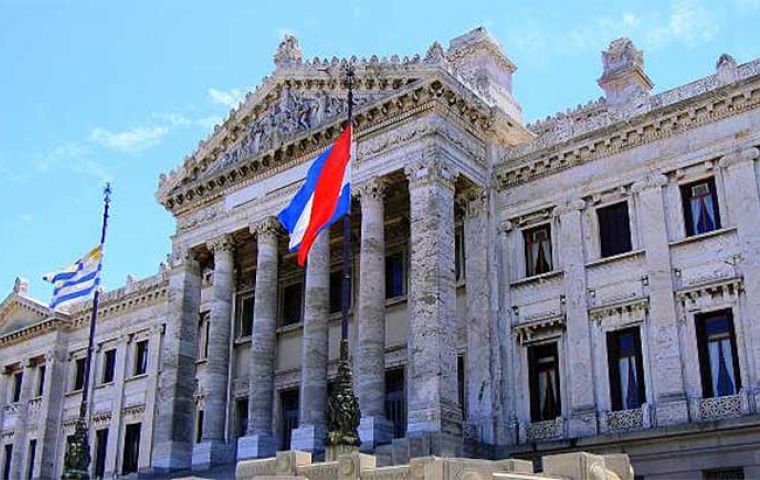MercoPress. South Atlantic News Agency
In a dull campaign and dull candidates, Uruguay votes new president and parliament on Sunday October 27

In less than two weeks time, Sunday 27 October, 2,8 million Uruguayan voters will be electing a new president, and a new parliament, 99 Lower House members and 30 Senators for the 2025/2030 period.
The political campaign contrary to tradition has been low key and has two main forces, the ruling Republican coalition made up of four different political parties including senior member National party to which president Luis Lacalle Pou belongs and an opposition Communist-Socialist-Christian Democrat coalition, under the name of Broad Front.
Voting in Uruguay is mandatory and opinion polls made public in the media indicate a very tight race, although as has happened in most Western democracies, it's not the best time for pollsters in spite of the use of continuous tracking and Artificial intelligence by some groupings. The fact is that Uruguay under Lacalle Pou and the Republican coalition weathered the Covid 19 pandemic with colors under the motto of “freedom with responsibility,” no lock in of the population, and following the dreadful time, the economy recovered fast and strongly with a good level of exports and international reserves, plus at the end of the five year period, record low inflation and record low unemployment.
Populist governments in neighboring Argentina, under the Kirchners, and in Chile, under incompetent, immature Boric and a rag tag team have ensured a sustained influx of foreign investment fleeing into safe Uruguay from uncertain political conditions. Said this, not all are roses in Uruguay, there is a very serious problem, (for Uruguayan standards) of crime and insecurity plus the drugs challenge, and opinion polls repeatedly point out to insecurity as the main problem of fear facing the Uruguayan society, and not limited to the capital Montevideo, but also extended to the quieter cities of the rural country.
All opinion polls indicate that from a floor of 47% , the main concern for Uruguayans is insecurity, followed by jobs 18%, 12%, inflation, poverty and 2% the economy.
Despite the fact that under the current government the police has started to recover their law and order clout it enjoyed sometime, but which vanished under the previous permissive populist governments, there is still ground to be recovered. In effect on Election day there will also be a referendum calling for allowing night raids of homes, on a magistrates order, and which is explicitly banned in the Constitution, but the drugs problem has become too serious and people's minds and feelings are changing. There is a 50/50 chance that it may be approved.
Likewise there is a second referendum, on social security, calling for a retirement age of 60. The current coalition after two years discussion, and an open invitation to the opposition to join, but which in second thoughts rejected, the retirement age was lifted to 65 beginning in 2030. Part of the opposition coalition supports returning to the 60 years target, sponsored by the communist led labor unions organization, but the rest are also against it but have kept quiet so as not to split the group's unity feeling electoral victory is at the reach of hand. This however, particularly how to finance the new adventure (already eight points of the 20% VAT consumers pay in Uruguay goes to finance pensions) is holding back investments, and in the last central bank monetary policy meeting, when all indicated a drop in the main rate, it was left unchanged at 8,5%, well above 5% declining inflation because of fears about the social security referendum, and uncertainty about the future if it is finally approved.
However finally if the current opinion polls circulated something indicate, given the Uruguayan ballot counting system, it could mean both coalitions, government and opposition have a similar number of Deputies 45/46 and Senators 15, and it leads us to the presidential candidates. In the ruling coalition, led by the National Party, the former secretary and right hand man of president Lacalle Pou is the candidate, Alvaro Delgado, he is more of a bureaucrat than a charismatic figure; then there is the Colorado party candidate Andres Ojeda, a young, 40, solicitor, full of enthusiasm but not much more; a former Army Chief, General Guido Manini Rios, and the candidate of a small Independent party, Horacio Mieres, a dull character who despite a minimum representation manages to be at the right place at the right moment.
On the opposition coalition Broad Front the candidate is a former county mayor, Yamandu Orsi, handpicked by ex president Jose Mujica, who seems to have the 'physique du role,' young, handsome, good looking, loved by women, a truly Uruguayan first name, until he starts talking, then he becomes 'Tribilin', the Disney character better known as Goofy in English, nobody really understands what he wants to say or his message. But on the other hand the Broad Front has dropped its policy of continuous criticism of Lacalle Pou, (despite 45/50% approval) with long forgotten radical Marxist narrative, and has decisively moved to the centre and right, talking of a need of having the business community and (big) farmers also share the table of the main decisions on Uruguay's future, with obviously no changes to the current economic policies and promoting investment..
Summing up, in spite of a low key electoral campaign and rather dull candidates, the outcome of October 27 Election Day in Uruguay, promises to be surprise. and a challenge for the country's political system, probably the most stable and serious of the Americas.




Top Comments
Disclaimer & comment rulesCommenting for this story is now closed.
If you have a Facebook account, become a fan and comment on our Facebook Page!